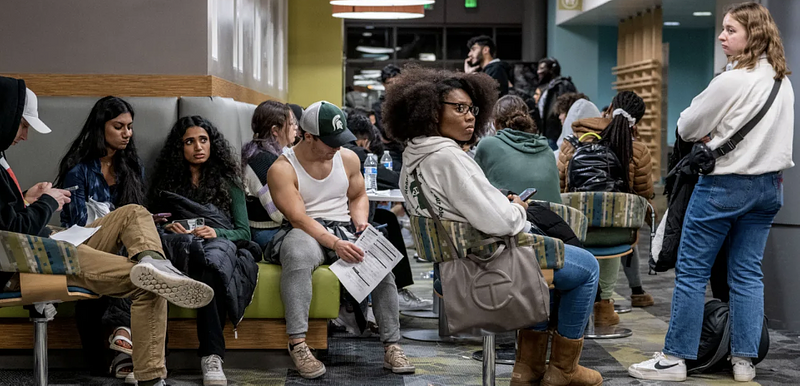
Tuesday's election set a new record for a midterm in Michigan, Benson says
Detroit — A record-setting 4.45 million Michigan voters cast ballots in Tuesday's gubernatorial election, according to unofficial results.
The previous record for a gubernatorial election, or midterm between presidential elections, was 4.34 million votes cast in the 2018 contest.
The 4.45 million votes are based on votes counted in the governor's race, where the Associated Press projects about 91% of the estimate voted have been counted.
“When the unofficial results are finalized, they will reflect that it was the highest turnout in a midterm election in Michigan’s history," Democratic Secretary of State Jocelyn Benson said Wednesday.
Benson said a record 2 million voters statewide had requested absentee ballots for the midterm, with 1.8 million of them having been returned.
"Thousands of Republican, Democrat and Independent election clerks and workers securely checked and counted ballots all through the day and night to provide Michigan voters with their unofficial election results far more quickly than expected largely because the process was smooth and absent of any significant disruptions," Benson said.
Benson said turnout is not the only mark of success. A significant marker of a smooth election is when the losing candidate graciously concedes defeat, which several did, Benson said.
"I want to emphasis how we're seeing candidates who previously denied accurate results of the 2020 election now graciously conceding defeat in their own high-profile races underscores that we've truly succeeded," Benson said. "In the days ahead clerks will now dedicate themselves to canvassing their elections to confirm the accuracy of the results before certification."
Benson's Republican opponent, Kristina Karamo, has not yet conceded the Secretary of State's race. Unofficial results show Benson defeated Karamo by 14 percentage points.
Once canvassing and any recounts are complete, multiple bipartisan post-election audits will take place, Benson said.
"I'm committed to seeing this process through on behalf of every voter," Benson said. "We will affirm, even more, the best practices we have in place. Following a record-breaking day like yesterday, I want every voter to know that their vote was counted fairly because we made Michigan history."
Absentee ballot voting has surged since 2018 when Michigan voters approved a constitutional amendment allowing any vote to obtain an absentee ballot. Under previous laws, absentee voting was limited to voters over age 62, military members, poll workers and individuals who were going to be out of town on election day.
Benson said Detroit voters had requested 90,000 absentee ballots, with 80,000 returned and 60,000 "that have already been processed and tabulated," Benson said.
Benson, who won her second term, added that the department is prepared to handle an influx of voting by absentee or in-person in the years ahead.
"There were no widespread or major disruptions reported to us today and any minor issues were addressed quickly and without stopping voters from casting their ballot," Benson said.
"We know of two instances where poll challengers may have acted inappropriately, but as our preparation was ready, poll workers practiced the de-escalation practices we had prepared, and after conversations, both challengers departed polling places without any major instances," Benson said of the instances in Ann Arbor and Detroit.
Benson added that there were "minor" problems with poll books, which she characterized as a "technology glitch."
"In a few instances this morning, upon checking in a voter, some electronic poll books at polling places displayed an error message stating that the number on the ballot that they were about to provide to the voter in the precinct was identical to a number on an absentee ballot that had already been issued," Benson said. "When this occurred, the poll worker then simply added an additional letter to the precinct ballot to distinguish them from the absentee ballot. Then the voters, who hadn't voted in any way, were able to cast their ballot."
When asked how many ballots were impacted, Benson said, "it doesn't appear that it was more than a handful. It was just individual anecdotal reports."
On Proposal 2's impact, Benson said nine days of early voting requires more preparation for next elections.
"Voters now have options and a new option of early voting, how they vote and our job is making sure all option are equally acceptable and we'll see probably different patterns emerge over a few election cycles," Benson said.
At the Tuesday night press conference, Benson also addressed her social media tiff Tuesday with former President Donald Trump, who posted about the poll book issue on his Truth Social account.
"The Absentee ballot situation Detroit is REALLY BAD," Trump wrote. "People are showing up to Vote only to be told, 'sorry, you have already voted.'"
Benson, responded to Trump's post on Twitter, writing: "This isn't true. Please don't spread lies to foment or encourage political violence in our state. Or anywhere."
During the Tuesday night press conference, Benson said: "Bad actors or folks with bad intentions will exploit these traditionally mundane and harmless issues to try to spread misinformation to raise money, get in the news or to delegitimize democracy. All of it is an unfortunate reality of where we are."
Link